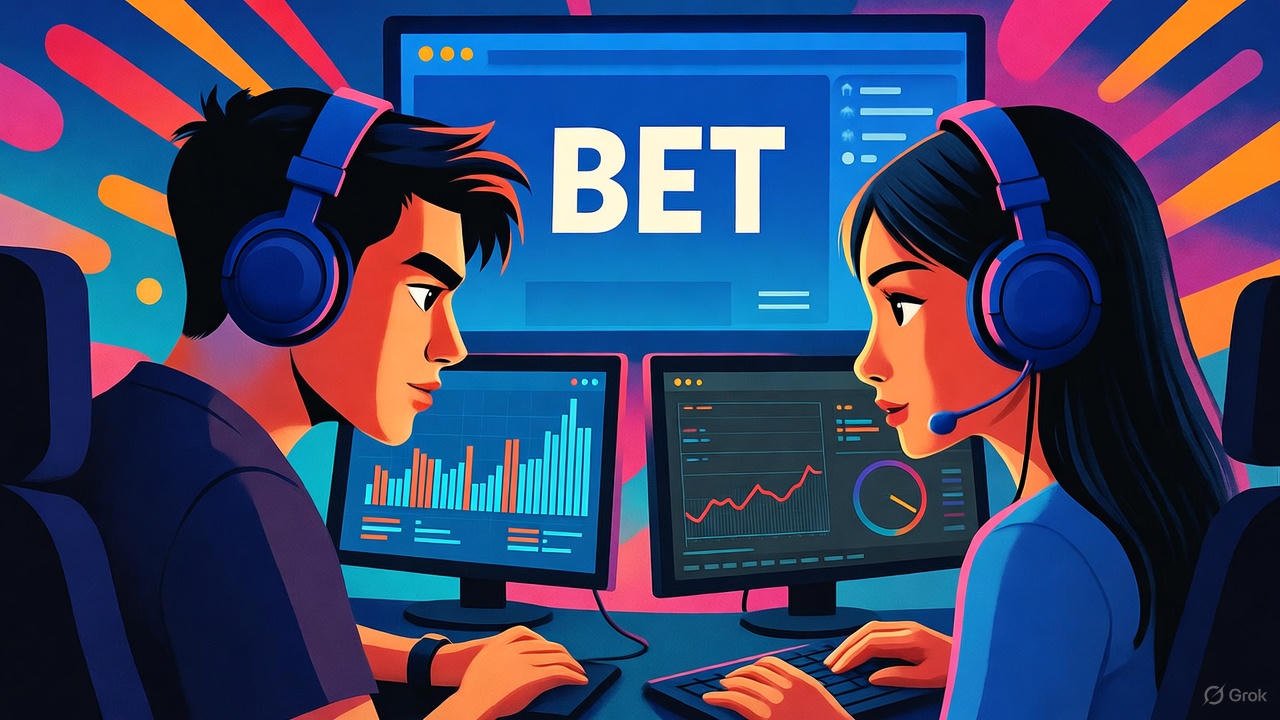Brazil’s online gaming industry is witnessing a seismic shift as esports betting emerges as a dominant force in the country’s rapidly expanding digital entertainment landscape. Fueled by a passionate gaming community, robust regulatory frameworks, and a surge in global esports popularity, Brazil is positioning itself as a powerhouse in this dynamic sector. Recent data from the Brazilian Gaming Association (BGA) indicates that esports betting revenue is projected to exceed R$10 billion by 2026, reflecting a 35% annual growth rate since the legalization of online betting under Bill 3626/2023.
The rise of esports betting reflects Brazil’s unique blend of cultural enthusiasm for competitive gaming and a tech-savvy population. With over 70 million active gamers and a mobile penetration rate surpassing 80%, the country offers fertile ground for this new form of wagering. Platforms like Bet365, a global leader in sports betting, have already integrated esports markets, offering odds on popular titles such as League of Legends, Counter-Strike 2, and Valorant. This development is not only reshaping how fans engage with their favorite games but also attracting significant investment from both domestic and international operators.
The Regulatory Backbone
The legalization of online betting in Brazil, formalized through Bill 3626/2023, has been a game-changer. Administered by the Secretariat of Prizes and Bets (SPA) under the Ministry of Finance, the regulatory framework ensures that only licensed operators can offer betting services, protecting consumers and fostering a transparent market. The SPA’s stringent requirements—covering financial stability, data security, and responsible gaming protocols—have instilled confidence among players and operators alike.
Esports betting, as a subset of this regulated market, benefits from these safeguards. Operators must adhere to strict guidelines, including age verification (18+), anti-money laundering measures, and tools to prevent problem gambling. “The SPA’s oversight has created a level playing field, allowing legitimate platforms to thrive while weeding out unregulated sites,” said Ana Costa, a regulatory analyst at the University of Rio de Janeiro. This structure has encouraged major players to expand their esports offerings, tailoring them to Brazil’s vibrant gaming culture.
Why Esports Betting Resonates in Brazil
Esports has deep roots in Brazil, where competitive gaming events like the Brasil Game Show draw tens of thousands of fans annually. Titles like Free Fire, developed by Garena, boast millions of active players, particularly among younger demographics. The accessibility of mobile-based esports has democratized participation, enabling fans in both urban centers like São Paulo and rural areas to engage with tournaments and place bets via smartphones.
Unlike traditional sports betting, esports wagering appeals to a digital-native audience familiar with gaming mechanics. Bettors can wager on outcomes such as match winners, map scores, or even in-game events like “first blood” in Dota 2. This granularity adds a layer of excitement, as fans leverage their game knowledge to inform their bets. “It’s not just about picking a team; it’s about understanding strategies and player performance,” said Lucas Almeida, a 24-year-old gamer and bettor from Recife. “It feels like you’re part of the action.”
Operators are capitalizing on this enthusiasm by offering live-streamed betting options, where users can watch matches and place real-time wagers through integrated platforms. Social media discussions on X highlight the appeal of these features, with users praising the seamless integration of streaming and betting interfaces. One post noted, “Watching a CS2 match and betting on the next round’s outcome is next-level adrenaline!”
Economic and Social Impacts
The economic ripple effects of esports betting are significant. The sector is expected to create over 15,000 jobs by 2027, spanning roles in software development, customer support, and event management. Tax revenues from licensed operators are projected to contribute R$2 billion annually to public coffers, funding sports programs and social initiatives. For instance, a portion of betting proceeds supports Brazil’s Olympic Committee, enhancing grassroots sports development.
However, the rapid growth raises concerns about addiction and underage access. Advocacy groups like the Brazilian Association for Responsible Gaming are pushing for stricter advertising regulations and enhanced educational campaigns. Operators are responding with features like deposit limits, self-exclusion tools, and partnerships with mental health organizations to promote responsible play.
Community engagement is another focus. Platforms are sponsoring local esports tournaments, such as the CBCS (Brazilian Counter-Strike Circuit), fostering talent and boosting regional pride. These initiatives resonate with Brazil’s youth, who see esports as both entertainment and a viable career path. “Sponsorships give young players a chance to shine,” said Marina Souza, organizer of the São Paulo Esports Festival. “It’s about building a sustainable ecosystem.”
Technological Innovations Driving Growth
Technology is at the heart of esports betting’s appeal. Advanced algorithms provide real-time odds, while AI-driven analytics offer bettors insights into team performance and player statistics. Mobile apps, optimized for low-bandwidth environments, ensure accessibility across Brazil’s diverse regions. Blockchain-based payment systems are also gaining traction, with some platforms exploring cryptocurrency deposits for faster, secure transactions.
Virtual reality (VR) and augmented reality (AR) are on the horizon, promising immersive betting experiences. Imagine watching a League of Legends match in VR, placing bets as you “stand” in the arena. Such innovations could redefine engagement, particularly for Brazil’s tech-curious audience. Companies like Esports.net are already exploring these trends, offering guides on emerging technologies in the betting space.
Challenges and Future Outlook
Despite its promise, esports betting faces hurdles. Regulatory compliance remains a challenge for smaller operators, with recent SPA audits revealing lapses in data protection among some firms. Public perception is another issue, as critics argue that aggressive marketing could normalize gambling among minors. To counter this, industry leaders are advocating for transparent RTP (return to player) metrics and mandatory age verification protocols.
Looking ahead, the 2026 FIFA World Cup, hosted in North America but with global viewership, is expected to boost cross-over interest in esports betting. Major tournaments like The International (Dota 2) and Valorant Champions will likely see record wagering volumes, driven by Brazil’s passionate fanbase. Operators are also eyeing partnerships with global gaming studios to offer exclusive betting markets, further integrating Brazil into the international esports ecosystem.
Player Perspectives and Market Dynamics
Bettors are enthusiastic but discerning. Social media feedback on X emphasizes the demand for fair odds and fast payouts, with Pix integration being a major draw due to its ubiquity in Brazil. “I want a platform that’s quick and trustworthy,” tweeted a user from Belo Horizonte. “No delays, no hidden fees.” Operators are listening, with many prioritizing local payment methods and Portuguese-language support to build trust.
Competition is fierce, with over 120 licensed operators vying for market share. Established brands like Bet365 and Betway dominate, but newer entrants are gaining ground by focusing on niche esports titles and localized promotions. Welcome bonuses, free bets, and loyalty programs are common, though regulators are cracking down on misleading offers to protect consumers.
Conclusion: A Game-Changing Opportunity
Esports betting in Brazil is more than a trend; it’s a cultural and economic phenomenon reshaping digital entertainment. With robust regulation, technological innovation, and a vibrant gaming community, the sector is poised for exponential growth. For fans, it offers a thrilling way to engage with esports; for the economy, it promises jobs and revenue; and for the industry, it signals Brazil’s arrival as a global player.
As platforms roll out new features and the market matures, the focus remains on balancing excitement with responsibility. Whether you’re a seasoned bettor or a curious newcomer, Brazil’s esports betting scene is one to watch. Stay tuned for updates as this dynamic industry continues to evolve.




